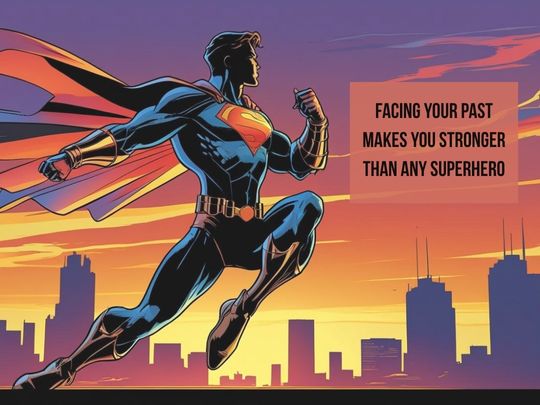
Superheroes are a crucial cornerstone of cinema. With the recent release of James Gunn’s ‘Superman’, and Craig Gillespie’s ‘Supergirl’ already slated for 2026, whether you’re a fan of the genre or not, revivals, remakes and reboots ensure every generation has the chance to connect with the men, or women, who wear an ‘S’ on their chest.
My interest in superheroes is limited, but I do enjoy their origin stories; understanding how extraordinary individuals came to understand how their innate or acquired qualities help them to save the world. Yet, it wasn’t until a visit to the Foundling Museum’s ‘Superheroes, Orphans & Origins’ exhibition a few years ago where I made the connection that the superheroes we treasure share a common trait – they’ve all experienced grief, loss, discrimination or isolation at a young age which fuels an internal fire to, mostly, fight for good. Put simply, they have nothing to lose.
Superman was adopted as a baby; Batman witnessed his parent’s murder as a child; and Spider Man was orphaned as a teenager.
This isn’t to suggest that trauma is good for us, or society, but this superhero theory reminds me that it’s our personal experience of an event that has the potential to generate trauma, opposed to the event itself – which is why two people can endure the same challenge and process it very differently. Not better, or worse. Just different.
While children may have counselling to support them during, or shortly after, a hard-hitting life experience, more often clients will choose to come to therapy as adults to process their past and explore its current impact on their life.
Looking back at childhood is significant because it’s a time when our actions and behaviours are unconsciously shaped by a range of sources – so understanding who we are now often requires us to explore who we felt called to be then, and why.
In addition to this, we know family dynamics are complex. Even those of us who advocate we grew up in stable households should feel able to admit that some of our emotional and physical needs – such as routine, security, affection and compassion – may not have been consistently met. And there may be several reasons for this, such as managing neurodivergent characteristics in a neurotypical family; having temporarily emotionally unavailable parents; or living in an environment underpinned by competition or criticism.
That’s why, when working with a counsellor, particularly during long-term talking therapy, you may spend time reviewing the physical and social contexts you were brought up in to help identify what you need now to improve your wellbeing – a psychoanalytical technique called ‘reparenting’ which can involve ‘unlearning harmful and unhelpful ways of being,’ in favour of new behaviours.
In my experience, the reparenting process won’t transform us overnight. In fact, it’s a tool we’ll want to commit to time and time again, to ensure it becomes a habit – because we're asking ourselves to move in the opposite direction of the learned behaviours that shaped us in our formative years.
Over the course of my counselling work, the prominent age that stands out to most clients when sharing distinct childhood experiences is 8-years-old. Perhaps unsurprising when research states “children’s memories don’t fully mature until about age 7”, according to Science magazine’s ‘Fading Memories of Youth’ article (March 2024).
They speak of the impact of raised voices. They describe feeling lonely following parental separation. They unconsciously mirrored an adult's silence. Whatever the situation, the memory lingers.
Superheroes may have chosen to use their powers to ensure good triumphs over evil by channelling their loss to protect the public, but the work put in by everyday counselling clients is remarkable. They’re choosing to face their past and make sense of it and remain authentic in the process by choosing to do it as themselves. No alter-egos, just the belief and determination that we, as humans, have the ability to tap into our inner resources to heal and grow because no one knows what we need better than ourselves.
Counselling is an opportunity to work through past and present issues to learn to cope more effectively and improve your overall wellbeing. If you’d like to access long-term, affordable counselling, contact The Fountain Therapy Trust, which offers in-person and online support for local people across New Malden, Kingston, Surbiton, Wimbledon and beyond.
Donna is an integrative counsellor running a small private practice, while supporting The Fountain Therapy Trust.
